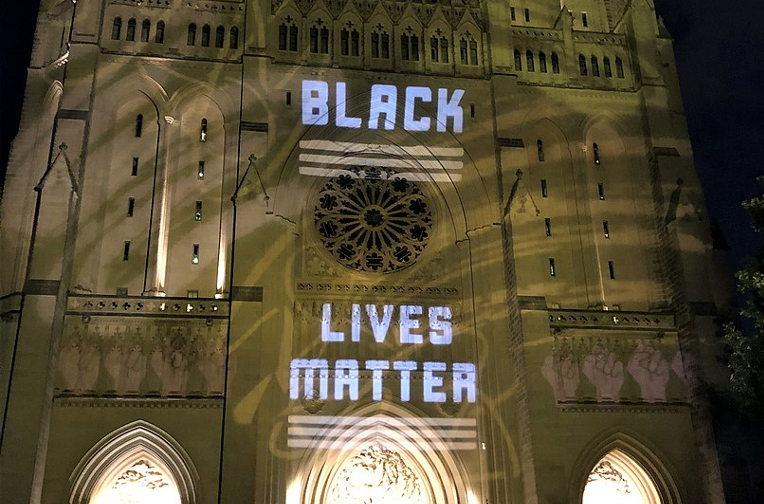It has been an awful and amazing two weeks – a time of reckoning that is long overdue, a time of coming together that, despite the tragic circumstances, has been enlivening. What is so remarkable is that the Black Lives Matter protests have been nested within a larger, unprecedented trauma, the pandemic. I have found the protests riveting and inspiring, and the brazen police brutality enraging. The outpouring has issued a call to all of us, especially white people, to look beyond the engrained American norms that have made life so dangerous and demoralizing for people of color.
Anthropologist/activist David Graeber sees the spontaneous protests as part of a larger movement. As he put it in a tweet: “Direct action and social movement are about the re-creation of society. Society has been taken from us. There has been a 40-year campaign to destroy attachments unmediated by the state or capital. This is the only way to start rebuilding it.” We are witnessing a re-convening of the American people and their ideals.
However, the pain of history is not past, as Faulkner once said. That’s because the past is not really past. It is very much with us, internalized, in the present. Thanks to the protests, triggered by a brazen murder carried out by an agent of the state and circulated on social media, a deeper shift in consciousness has begun. It is now clear that there are really no bystanders. We are all implicated, particularly those with white privilege. As the artist Banksy put it, “At first I thought I should just shut up and listen to black people about this issue. But why would I do that? It’s not their problem. It’s mine.”
This very idea enrages President Trump, whose denial is manifest in countless deflections and vile insults aimed at protecting white supremacy. Thankfully, history is not trending in his direction. Already major corporations and even the National Football League, the long-time nemesis of “take a knee” quarterback Colin Kaepernick, now publicly support Black Lives Matter. The burden has visibly shifted to white people to look within themselves and take affirmative steps for change.
How refreshing, too, to see ordinary people assert a new vision of history in real time! Citizens have spontaneously toppled statues honoring Confederate General Robert E. Lee and Christopher Columbus. In Bristol, England, a crowd threw the statute of 17th century slave-trader Edward Colston – responsible for selling more than 84,000 Africans into slavery — into the harbor.
The demonstrations are welcome in these respects, but, ominously, they are also evidence of a profound crisis of legitimacy in American life to which the market/state system is not likely to be able to respond effectively. In a sobering piece in The Atlantic, “Shouting Into the Institutional Void,” journalist George Packer notes:
The protesters aren’t speaking to leaders who might listen, or to a power structure that might yield, except perhaps the structure of white power, which is too vast and diffuse to respond. Congress isn’t preparing a bill to address root causes; Congress no longer even tries to solve problems. No president, least of all this one, could assemble a commission of respected figures from different sectors and parties to study the problem of police brutality and produce a best-selling report [the official Kerner Report that studied the origins of the 1968 race riots] with a consensus for fundamental change. A responsible establishment doesn’t exist. Our president is one of the rioters.
After half a century of social dissolution, of polarization by class and race and region and politics, there are no functioning institutions or leaders to fail us with their inadequate response to the moment’s urgency. Levers of influence no longer connect to sources of power. Democratic protections—the eyes of a free press, the impartiality of the law, elected officials acting out of conscience or self-interest—have lost public trust. The protesters are railing against a society that isn’t cohesive enough to summon a response. They’re hammering on a hollowed-out structure, and it very well may collapse.
Packer’s insight suggests some troubling dangers ahead. We’ve already seen the rise of violent proto-fascist and white supremacist networks and the weakness of state institutions and law. On the other hand, we also have some rich, positive opportunities to transform our political economy and culture – if we can assert a coherent vision for a paradigm shift, if we can get beyond a reversion to a tepid (capitalist-oriented) liberalism.
The state is not impotent in the coming drama, but it is surely distrusted, for good reasons. It has been far more committed to a utopian neoliberalism than to a vision that provides dignity for all citizens, healthcare during a pandemic, basic food and shelter during an unprecedented economic recession/depression, and existential protection as the earth’s atmosphere and ecosystems collapse from too much market growth.
Since the state is so entangled in its deep alliance with capital, the real energy and thought for structural change will not likely be coming from within those circle or traditional politics. It can only come from us – commoners and care workers, families and communities, water protectors and Indigenous peoples, and all others whose fates have not been captured or co-opted by the established, dysfunctional system.
Despite the many traumas, the past two weeks give me great hope. Deep human truths can still be expressed, heard and acted upon. They have a raw power of their own, if we dare to honor them. But how to deal with the institutional void that George Packer notes? How to build new social attitudes and institutions that can meet our urgent needs, that can build a “more perfect union”? Aye, that is the unmet challenge ahead.






